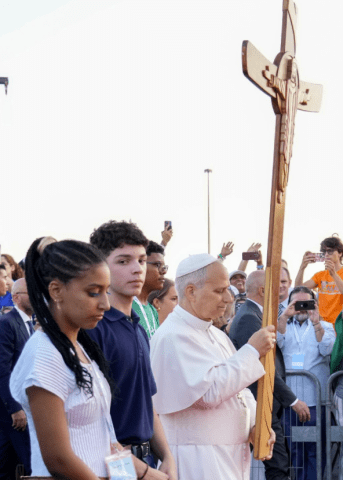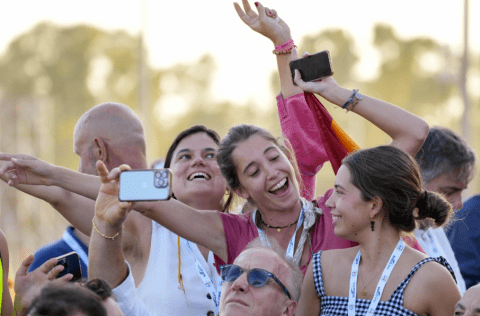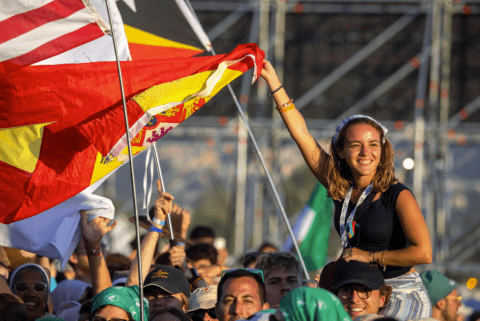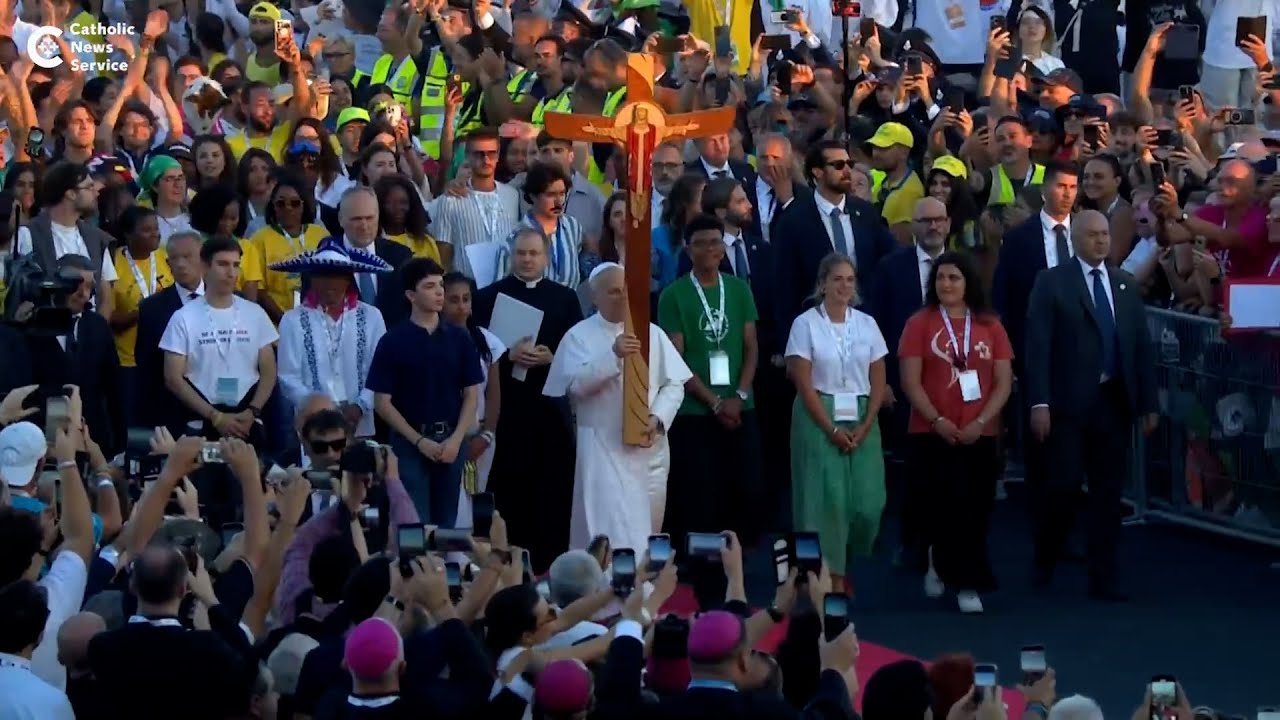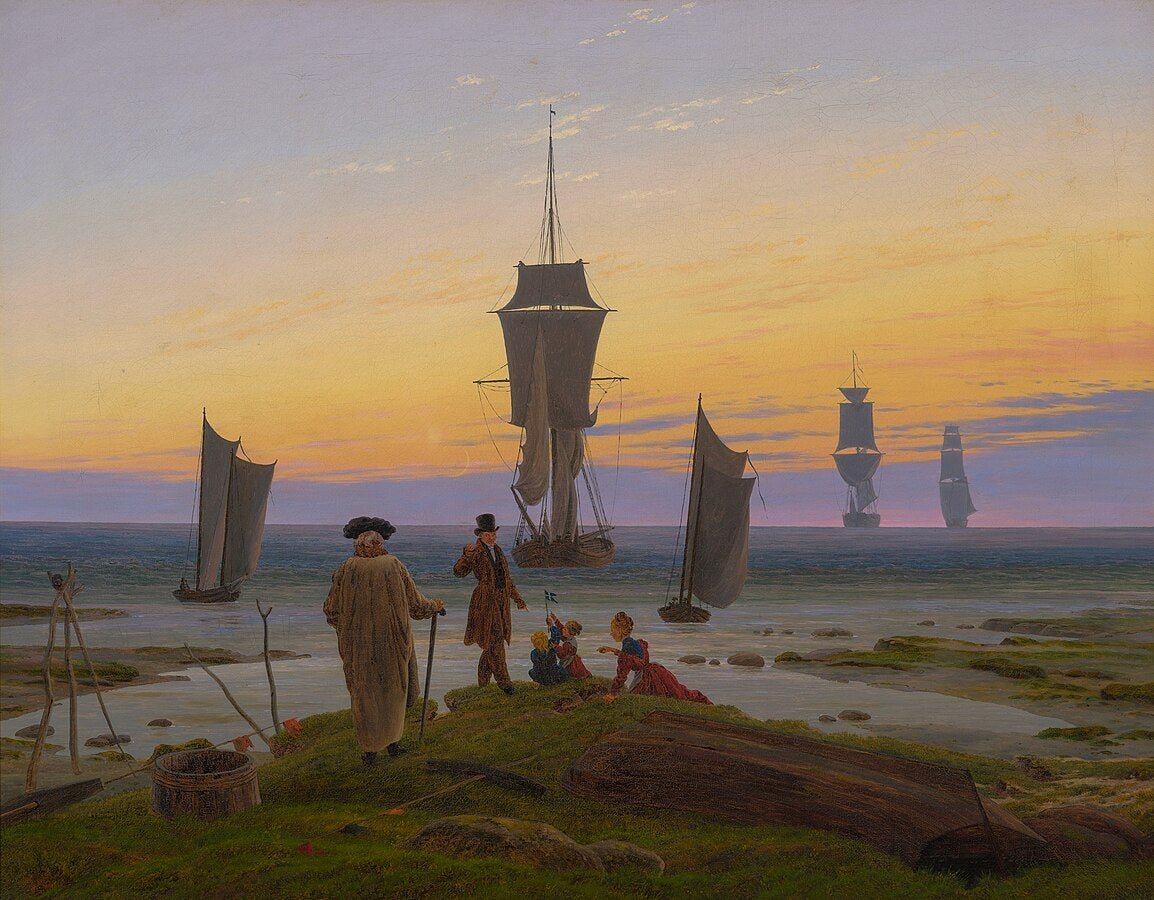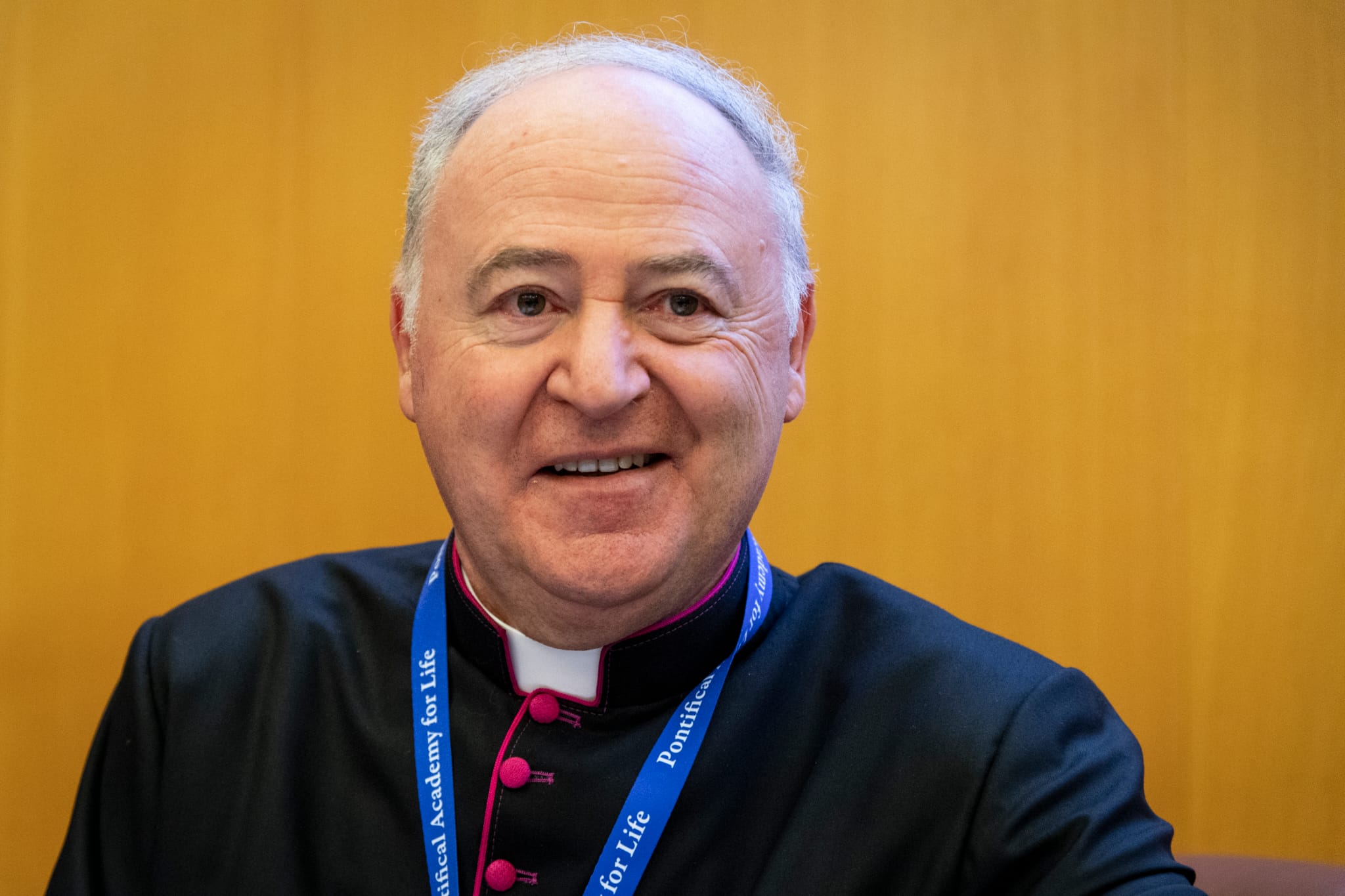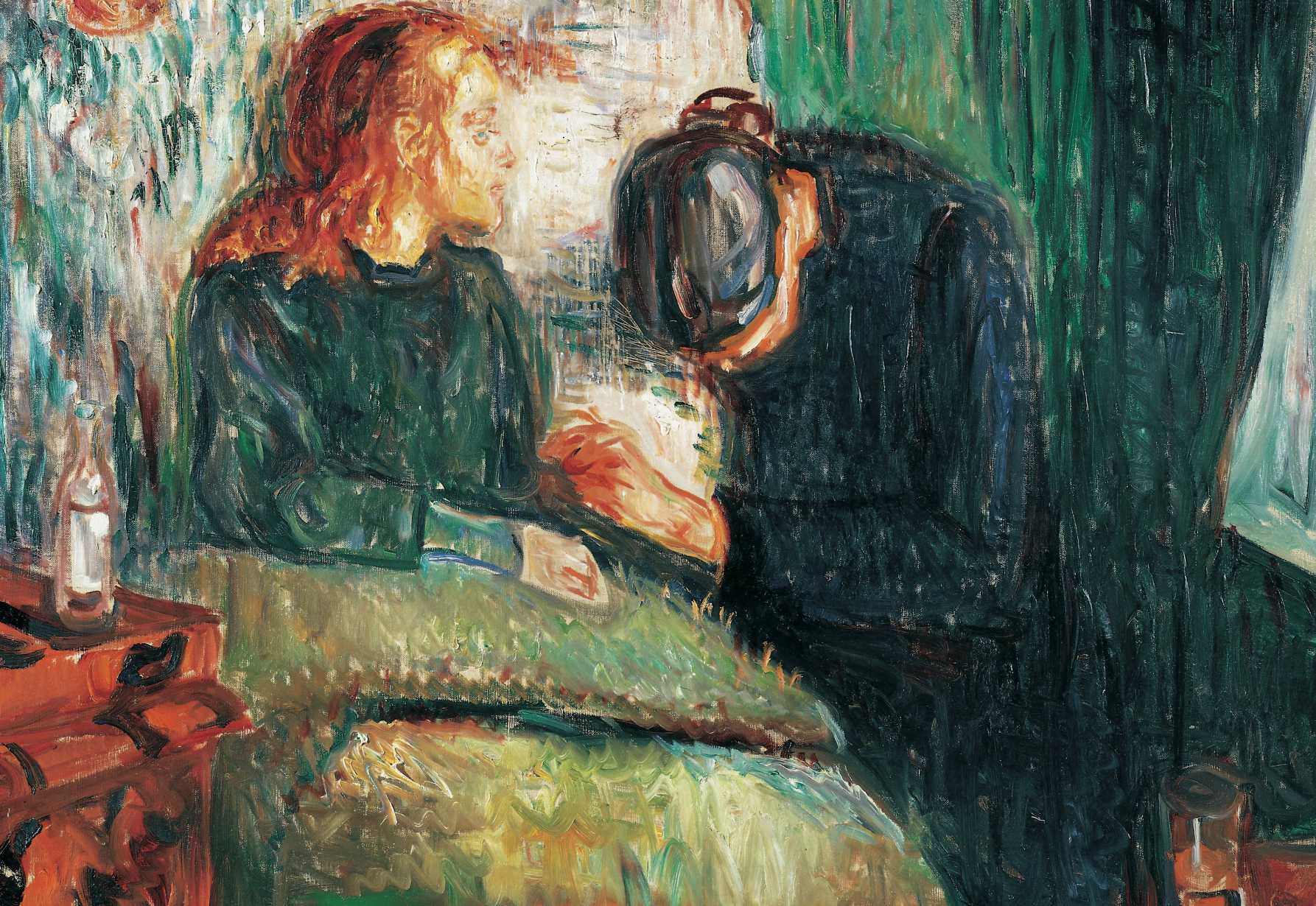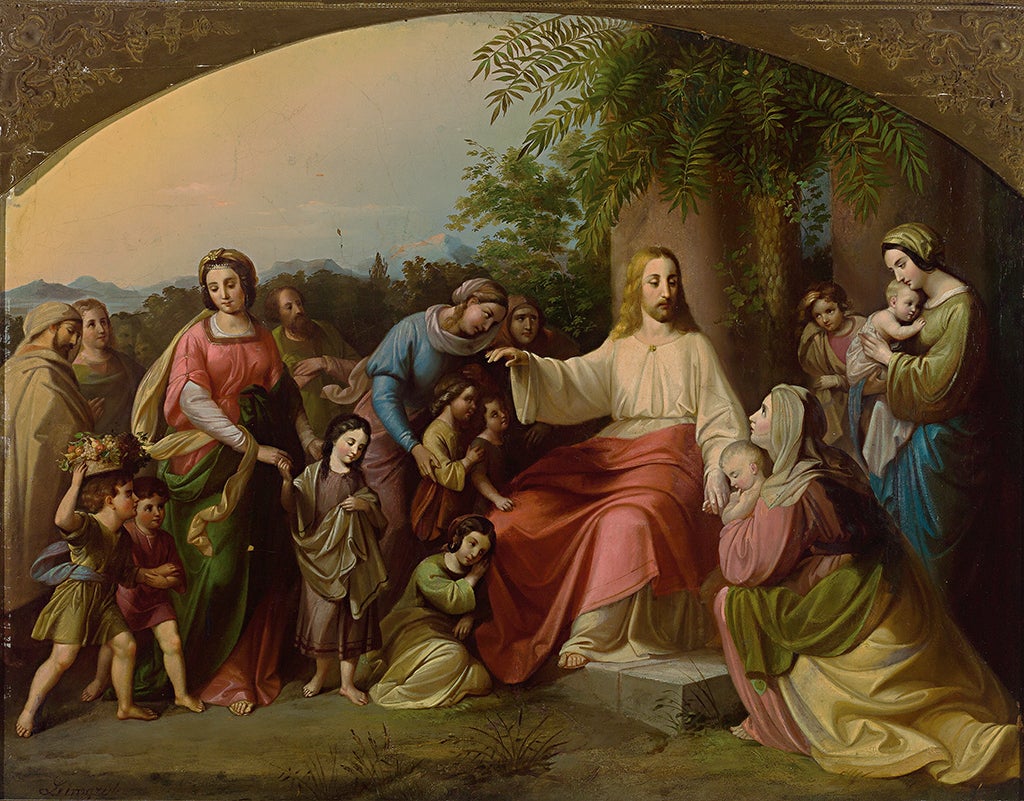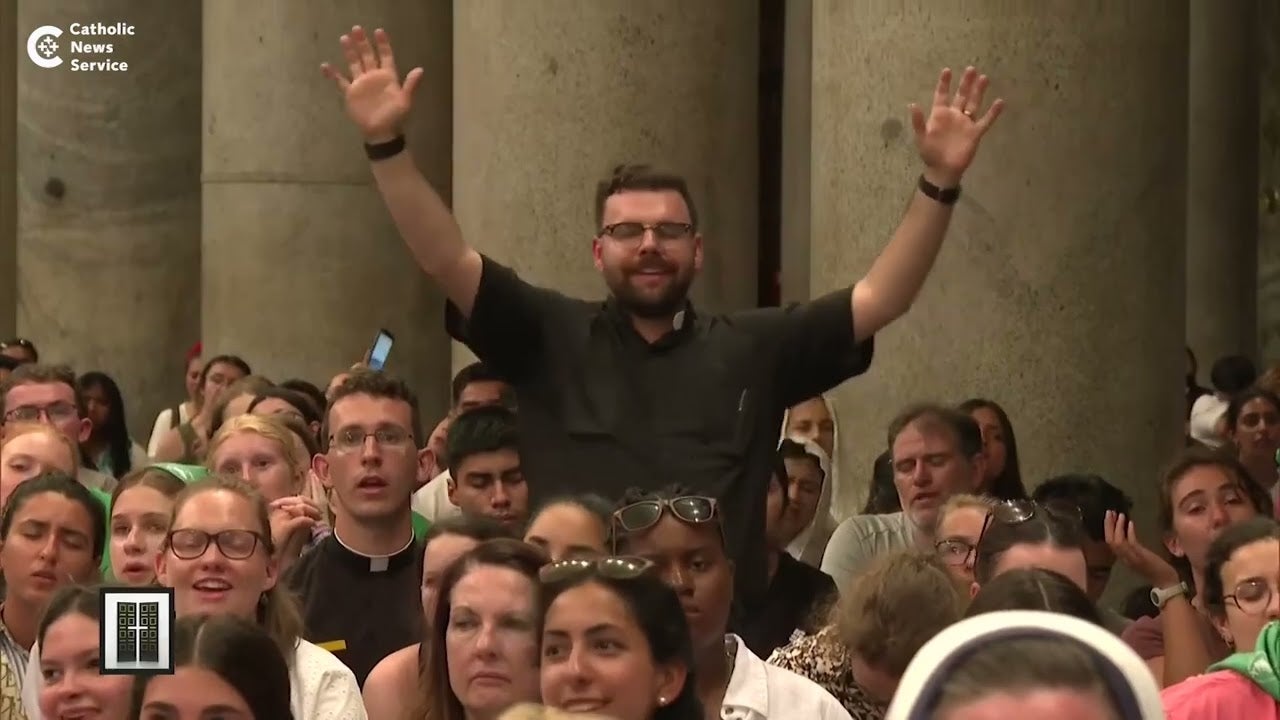Browsing News Entries
Memorial of Saint John Vianney, Priest
Posted on 08/4/2025 08:30 AM (USCCB Daily Readings)
- Readings for the Memorial of Saint John Vianney, Priest
Reading 1 Numbers 11:4b-15
The children of Israel lamented,
"Would that we had meat for food!
We remember the fish we used to eat without cost in Egypt,
and the cucumbers, the melons, the leeks,
the onions, and the garlic.
But now we are famished;
we see nothing before us but this manna."
Manna was like coriander seed and had the color of resin.
When they had gone about and gathered it up,
the people would grind it between millstones or pound it in a mortar,
then cook it in a pot and make it into loaves,
which tasted like cakes made with oil.
At night, when the dew fell upon the camp, the manna also fell.
When Moses heard the people, family after family,
crying at the entrance of their tents,
so that the LORD became very angry, he was grieved.
"Why do you treat your servant so badly?" Moses asked the LORD.
"Why are you so displeased with me
that you burden me with all this people?
Was it I who conceived all this people?
Or was it I who gave them birth,
that you tell me to carry them at my bosom,
like a foster father carrying an infant,
to the land you have promised under oath to their fathers?
Where can I get meat to give to all this people?
For they are crying to me,
'Give us meat for our food.'
I cannot carry all this people by myself,
for they are too heavy for me.
If this is the way you will deal with me,
then please do me the favor of killing me at once,
so that I need no longer face this distress."
Responsorial Psalm Psalm 81:12-13, 14-15, 16-17
R. (2a) Sing with joy to God our help.
"My people heard not my voice,
and Israel obeyed me not;
So I gave them up to the hardness of their hearts;
they walked according to their own counsels."
R. Sing with joy to God our help.
"If only my people would hear me,
and Israel walk in my ways,
Quickly would I humble their enemies;
against their foes I would turn my hand."
R. Sing with joy to God our help.
"Those who hated the LORD would seek to flatter me,
but their fate would endure forever,
While Israel I would feed with the best of wheat,
and with honey from the rock I would fill them."
R. Sing with joy to God our help.
Alleluia Matthew 4:4
R. Alleluia, alleluia.
One does not live on bread alone,
but on every word that comes forth from the mouth of God.
R. Alleluia, alleluia.
Gospel Matthew 14:13-21
When Jesus heard of the death of John the Baptist,
he withdrew in a boat to a deserted place by himself.
The crowds heard of this and followed him on foot from their towns.
When he disembarked and saw the vast crowd,
his heart was moved with pity for them, and he cured their sick.
When it was evening, the disciples approached him and said,
"This is a deserted place and it is already late;
dismiss the crowds so that they can go to the villages
and buy food for themselves."
He said to them, "There is no need for them to go away;
give them some food yourselves."
But they said to him,
"Five loaves and two fish are all we have here."
Then he said, "Bring them here to me,"
and he ordered the crowds to sit down on the grass.
Taking the five loaves and the two fish, and looking up to heaven,
he said the blessing, broke the loaves,
and gave them to the disciples,
who in turn gave them to the crowds.
They all ate and were satisfied,
and they picked up the fragments left over–
twelve wicker baskets full.
Those who ate were about five thousand men,
not counting women and children.
Lectionary for Mass for Use in the Dioceses of the United States, second typical edition, Copyright © 2001, 1998, 1997, 1986, 1970 Confraternity of Christian Doctrine; Psalm refrain © 1968, 1981, 1997, International Committee on English in the Liturgy, Inc. All rights reserved. Neither this work nor any part of it may be reproduced, distributed, performed or displayed in any medium, including electronic or digital, without permission in writing from the copyright owner.
Pope Leo urges youth to find hope, friendship in Christ in uncertain times
Posted on 08/3/2025 08:30 AM (USCCB News Releases)
ROME (CNS) — Addressing an estimated 1 million young people, Pope Leo XIV urged them to forge genuine relationships rooted in Christ rather than ephemeral online connections that can reduce individuals to a commodity.
"When a tool controls someone, that person becomes a tool: a commodity on the market and, in turn, a piece of merchandise," the pope said during the evening prayer vigil for the Jubilee of Youth Aug. 2. "Only genuine relationships and stable connections can build good lives."
The pope arrived by helicopter at the Tor Vergata field, roughly eight miles southeast of Rome's city center, and was greeted with cheers from young people waving flags. Many of the youth were going to camp out overnight, sleeping in tents and sleeping bags on the dusty field, much like the World Youth Day celebration held 25 years ago in the same location.
Countless young people kicked up the dust from the field as they ran alongside the popemobile to catch a glimpse of the pontiff. Pope Leo smiled and waved at the youth, occasionally catching objects and plush toys that were hurled his way.
Exiting the popemobile, he was handed the large Jubilee year cross, which he carried to the main altar, accompanied by dozens of young people.
After beginning the vigil with prayers, the pope engaged in a dialogue with several young people who asked him three questions.
Dulce Maria, a 23-year-old woman from Mexico, spoke of the excitement of online friendships but also of the loneliness that comes from connections that are "not true and lasting relationships, but rather fleeting and often illusory."
"How can we find true friendship and genuine love that will lead us to true hope? How can faith help us build our future?" she asked.
Pope Leo acknowledged the potential of the internet and social media as "an extraordinary opportunity for dialogue," but warned that these tools "are misleading when they are controlled by commercialism and interests that fragment our relationships."
Drawing from his Augustinian spirituality, Pope Leo urged young people to emulate St. Augustine, who had a "restless youth, but he did not settle for less."
"How did he find true friendship and a love capable of giving hope? By finding the one who was already looking for him, Jesus Christ," the pope said. "How did he build his future? By following the one who had always been his friend."
Gaia, a 19-year-old woman from Italy, asked how young people can find the courage to make choices amid uncertainty.
"To choose is a fundamental human act," the pope responded. "When we make a choice, in the strict sense, we decide who we want to become."
He encouraged young people to remember they were chosen by God, and that "the courage to choose comes from love, which God shows us in Christ."
The pope recalled St. John Paul II's words spoken in the same place 25 years ago, reminding the youth that "it is Jesus in fact that you seek when you dream of happiness; he is waiting for you when nothing else you find satisfies you."
The pope called "radical and meaningful choices," such as marriage, priesthood and religious life, "the free and liberating gift of self that makes us truly happy."
"These choices give meaning to our lives, transforming them into the image of the perfect love that created them and redeemed them from all evil, even from death," he said.
Departing from his prepared remarks, Pope Leo expressed condolences for the deaths of two pilgrims. Pascale Rafic, an 18-year-old pilgrim from Egypt, who died due to a heart condition. Earlier in the day, the pope met with a group of Egyptian youth with whom Rafic traveled to Rome.
Maria Cobo Vergara, a 20-year-old pilgrim from Madrid, Spain, died July 30. While the cause of death was not mentioned in a statement published Aug. 1, the Archdiocese of Madrid said the young pilgrim suffered "four years of illness."
"Both (pilgrims) chose to come to Rome for the Jubilee of Youth, and death has taken them in these days," the pope said at the vigil. "Let us pray together for them."
Lastly, 20-year-old Will, a young pilgrim from the United States, asked the pope how to "truly encounter the Risen Lord in our lives and be sure of his presence even in the midst of trials and uncertainties."
Recalling Pope Francis' papal bull for the Holy Year 2025, "Spes non confundit" ("Hope Does Not Disappoint"), Pope Leo said that "hope dwells as the desire and expectation of good things to come," and that one's understanding of good "reflects how our conscience has been shaped by the people in our lives."
He urged them to foster their conscience by listening to Jesus' word and to "reflect on your way of living, and seek justice in order to build a more humane world."
"Serve the poor, and so bear witness to the good that we would always like to receive from our neighbors," he said. "Adore Christ in the Blessed Sacrament, the source of eternal life. Study, work and love according to the example of Jesus, the good Teacher who always walks beside us."
He also invited young people to pray to remain friends with Jesus and be "a companion on the journey for anyone I meet."
"Through praying these words, our dialogue will continue each time we look at the crucified Lord, for our hearts will be united in him," the pope concluded.
Eighteenth Sunday in Ordinary Time
Posted on 08/3/2025 08:30 AM (USCCB Daily Readings)
Reading 1 Ecclesiastes 1:2; 2:21-23
Vanity of vanities, says Qoheleth,
vanity of vanities! All things are vanity!
Here is one who has labored with wisdom and knowledge and skill,
and yet to another who has not labored over it,
he must leave property.
This also is vanity and a great misfortune.
For what profit comes to man from all the toil and anxiety of heart
with which he has labored under the sun?
All his days sorrow and grief are his occupation;
even at night his mind is not at rest.
This also is vanity.
Responsorial Psalm Psalm 90:3-4, 5-6, 12-13, 14 and 17
R. (1) If today you hear his voice, harden not your hearts.
You turn man back to dust,
saying, “Return, O children of men.”
For a thousand years in your sight
are as yesterday, now that it is past,
or as a watch of the night.
R. If today you hear his voice, harden not your hearts.
You make an end of them in their sleep;
the next morning they are like the changing grass,
Which at dawn springs up anew,
but by evening wilts and fades.
R. If today you hear his voice, harden not your hearts.
Teach us to number our days aright,
that we may gain wisdom of heart.
Return, O LORD! How long?
Have pity on your servants!
R. If today you hear his voice, harden not your hearts.
Fill us at daybreak with your kindness,
that we may shout for joy and gladness all our days.
And may the gracious care of the LORD our God be ours;
prosper the work of our hands for us!
Prosper the work of our hands!
R. If today you hear his voice, harden not your hearts.
Reading 2 Colossians 3:1-5, 9-11
Brothers and sisters:
If you were raised with Christ, seek what is above,
where Christ is seated at the right hand of God.
Think of what is above, not of what is on earth.
For you have died,
and your life is hidden with Christ in God.
When Christ your life appears,
then you too will appear with him in glory.
Put to death, then, the parts of you that are earthly:
immorality, impurity, passion, evil desire,
and the greed that is idolatry.
Stop lying to one another,
since you have taken off the old self with its practices
and have put on the new self,
which is being renewed, for knowledge,
in the image of its creator.
Here there is not Greek and Jew,
circumcision and uncircumcision,
barbarian, Scythian, slave, free;
but Christ is all and in all.
Alleluia Matthew 5:3
R. Alleluia, alleluia.
Blessed are the poor in spirit,
for theirs is the kingdom of heaven.
R. Alleluia, alleluia.
Gospel Luke 12:13-21
Someone in the crowd said to Jesus,
“Teacher, tell my brother to share the inheritance with me.”
He replied to him,
“Friend, who appointed me as your judge and arbitrator?”
Then he said to the crowd,
“Take care to guard against all greed,
for though one may be rich,
one’s life does not consist of possessions.”
Then he told them a parable.
“There was a rich man whose land produced a bountiful harvest.
He asked himself, ‘What shall I do,
for I do not have space to store my harvest?’
And he said, ‘This is what I shall do:
I shall tear down my barns and build larger ones.
There I shall store all my grain and other goods
and I shall say to myself, “Now as for you,
you have so many good things stored up for many years,
rest, eat, drink, be merry!”’
But God said to him,
‘You fool, this night your life will be demanded of you;
and the things you have prepared, to whom will they belong?’
Thus will it be for all who store up treasure for themselves
but are not rich in what matters to God.”
Lectionary for Mass for Use in the Dioceses of the United States, second typical edition, Copyright © 2001, 1998, 1997, 1986, 1970 Confraternity of Christian Doctrine; Psalm refrain © 1968, 1981, 1997, International Committee on English in the Liturgy, Inc. All rights reserved. Neither this work nor any part of it may be reproduced, distributed, performed or displayed in any medium, including electronic or digital, without permission in writing from the copyright owner.
Saturday of the Seventeenth Week in Ordinary Time
Posted on 08/2/2025 08:30 AM (USCCB Daily Readings)
Reading 1 Leviticus 25:1, 8-17
The LORD said to Moses on Mount Sinai,
"Seven weeks of years shall you count–seven times seven years–
so that the seven cycles amount to forty-nine years.
Then, on the tenth day of the seventh month, let the trumpet resound;
on this, the Day of Atonement, the trumpet blast shall re-echo
throughout your land.
This fiftieth year you shall make sacred
by proclaiming liberty in the land for all its inhabitants.
It shall be a jubilee for you,
when every one of you shall return to his own property,
every one to his own family estate.
In this fiftieth year, your year of jubilee,
you shall not sow, nor shall you reap the aftergrowth
or pick the grapes from the untrimmed vines.
Since this is the jubilee, which shall be sacred for you,
you may not eat of its produce,
except as taken directly from the field.
"In this year of jubilee, then,
every one of you shall return to his own property.
Therefore, when you sell any land to your neighbor
or buy any from him, do not deal unfairly.
On the basis of the number of years since the last jubilee
shall you purchase the land from your neighbor;
and so also, on the basis of the number of years for crops,
shall he sell it to you.
When the years are many, the price shall be so much the more;
when the years are few, the price shall be so much the less.
For it is really the number of crops that he sells you.
Do not deal unfairly, then; but stand in fear of your God.
I, the LORD, am your God."
Responsorial Psalm Psalm 67:2-3, 5, 7-8
R. (4) O God, let all the nations praise you!
May God have pity on us and bless us;
may he let his face shine upon us.
So may your way be known upon earth;
among all nations, your salvation.
R. O God, let all the nations praise you!
May the nations be glad and exult
because you rule the peoples in equity;
the nations on the earth you guide.
R. O God, let all the nations praise you!
The earth has yielded its fruits;
God, our God, has blessed us.
May God bless us,
and may all the ends of the earth fear him!
R. O God, let all the nations praise you!
Alleluia Matthew 5:10
R. Alleluia, alleluia.
Blessed are they who are persecuted for the sake of righteousness
for theirs is the Kingdom of heaven.
R. Alleluia, alleluia.
Gospel Matthew 14:1-12
Herod the tetrarch heard of the reputation of Jesus
and said to his servants, "This man is John the Baptist.
He has been raised from the dead;
that is why mighty powers are at work in him."
Now Herod had arrested John, bound him, and put him in prison
on account of Herodias, the wife of his brother Philip,
for John had said to him,
"It is not lawful for you to have her."
Although he wanted to kill him, he feared the people,
for they regarded him as a prophet.
But at a birthday celebration for Herod,
the daughter of Herodias performed a dance before the guests
and delighted Herod so much
that he swore to give her whatever she might ask for.
Prompted by her mother, she said,
"Give me here on a platter the head of John the Baptist."
The king was distressed,
but because of his oaths and the guests who were present,
he ordered that it be given, and he had John beheaded in the prison.
His head was brought in on a platter and given to the girl,
who took it to her mother.
His disciples came and took away the corpse
and buried him; and they went and told Jesus.
- Readings for the Optional Memorial of Saint Eusebius of Vercelli, Bishop
- Readings for the Optional Memorial of Saint Peter Julian Eymard, Priest
Lectionary for Mass for Use in the Dioceses of the United States, second typical edition, Copyright © 2001, 1998, 1997, 1986, 1970 Confraternity of Christian Doctrine; Psalm refrain © 1968, 1981, 1997, International Committee on English in the Liturgy, Inc. All rights reserved. Neither this work nor any part of it may be reproduced, distributed, performed or displayed in any medium, including electronic or digital, without permission in writing from the copyright owner.
CNS interviews the new president of the Pontifical Academy for Life
Posted on 08/1/2025 08:30 AM (USCCB News Releases)
VATICAN CITY (CNS) -- One of Pope Leo XIV's early appointments was naming Msgr. Renzo Pegoraro to be the new president of the Pontifical Academy for Life.
The 66-year-old monsignor is a bioethicist who earned a medical degree before entering the seminary, and he had served as chancellor of the academy since 2011 before succeeding Archbishop Vincenzo Paglia as president at the end of May.
Msgr. Pegoraro earned his medical degree from the University of Padua, Italy, in 1985, before earning a degree in moral theology from the Pontifical Gregorian University in Rome. He was ordained to the priesthood in 1989.
He earned an advanced degree in bioethics from Italy's Catholic University of the Sacred Heart and has taught bioethics at the Theological Faculty of Northern Italy and served as secretary-general of Padua's Lanza Foundation, a center for studies in ethics, bioethics and environmental ethics. He taught nursing ethics at the Vatican-owned Bambino Gesù Pediatric Hospital in Rome and was president of the European Association of Centers for Medical Ethics from 2010 to 2013.
Catholic News Service reached out to Msgr. Pegoraro for an interview in July. He took time out of a trip outside of Rome to respond to our questions. His written responses are translated from the original Italian.
- - -
Congratulations on your appointment. Did Pope Leo XIV say anything to you about your appointment or give you any indications and insight as to the priorities or the role the academy can play in his ministry?
The recommendations are to continue the work of discussion and dialogue with experts from various disciplines on the challenges facing humanity on the theme of life and the quality of life in different contexts. And without forgetting issues related to the beginning and end of life, as well as environmental sustainability, equity in healthcare systems, the right to care, health and essential services. We live in a difficult landscape, marked by advancing technologies but also by conflicts, and human life on the planet is truly challenged. The church has a wealth of wisdom and a vision to serve everyone in order to make the world a better and more livable place.
Do you know how the pope will approach the topic of AI -- for example, an encyclical -- and will your academy play a role in giving him input, the way the Dicastery for Integral Human Development helped Pope Francis with 'Laudato Si''?
Pope Leo XIV demonstrated early on, with the choice of his name, that he is putting social issues and integral human development first. He has already spoken on several occasions about technological challenges and AI. In this sense, the Pontifical Academy for Life can make an important contribution to the development of the papal Magisterium, in line with all the dicasteries.
Will there be any follow-up to what came out of the seminar/study of the Theological Ethics of Life? How will the academy continue to explore and address topics like abortion, IVF, contraception and end-of-life issues?
The reflection of our academics continues. We are following the debates underway in different countries, as well as in Italy, where there is a law before parliament. The Pontifical Academy for Life supports and promotes palliative care, always and especially in the final and fragile phases of life, always asking that there be attention to and respect for the protection and dignity of people who are frail.
How can the church communicate its bioethical/life teachings better wherever there is a lot of debate or polarization?
This is a very important issue. We do our best to offer in-depth and articulate reflections. For example, our general assembly of academics, which includes an international conference, will address the sustainability of health systems in February 2026, with examples from five continents and detailed studies. We work this way: to offer a contribution; it is our desire to broaden collaboration as much as possible with everyone who is truly interested in the common good, believers and nonbelievers alike, in a spirit of mutual learning.
Will you continue to promote a transdisciplinary approach of dialogue with experts beyond the Catholic Church, much like the way the Pontifical Academies for the Sciences and Social Sciences operate? If so, how do you go about reassuring Catholics who wish the academy only had members and presentations that are aligned with church teaching? How do you avoid any so-called 'confusion?'
The Pontifical Academy for Life, since its beginning, has been a place of study, dialogue, discussion and reflection among experts from different disciplines. And it has continued its work in the service of the church, to analyze developments in science and technology that have to do with human life and to always understand how to defend the dignity of the human person. In this sense, the church, in continuity, is always staying up-to-date, as the Second Vatican Council put it so well.
Tell me about being both a physician and a priest. Are you the first president of the PAL who is a medical doctor? How do you balance what you saw and learned in the field -- your clinical experience -- with your ethical reasoning? Such as respecting a patient’s autonomy and respecting church teaching when it comes to assisted suicide or refusing aggressive treatment?
I remember that the first president, the late Dr. Jerome Lejeune, was a physician, a scientist of the highest class, worthy of a Nobel Prize for his studies. And later, Msgr. Ignacio Carrasco de Paula, who served as president from 2010 to 2016, is a medical psychiatrist and priest, a high-level expert in bioethics.
Having expertise in the medical field is a great help in having a more precise understanding of the findings and challenges that arise on an ethical level. But there is more than that, as you point out in your question. Today, in addition to scientific knowledge, there is a need for an ethical point of view and an awareness of the questions that come from patients, from those who are sick. The church can respond.
For example, on the issue of end-of-life, the church says 'no' to aggressive medical treatment -- therapeutic obstinacy -- and 'yes' to the use of palliative care to manage and reduce pain and suffering.
The studies and insights we have made in recent years are just as important on the topics of stem cells and biotechnology, neonatal screening, organ transplantation and innovations in digital medicine and health care technology. These are all efforts to better understand scientific developments so that we can put them at the service of people.
Could you better explain if there have been any changes or new recommendations when it comes to avoiding aggressive treatment and the requirement to provide food and hydration to individuals in a vegetative state? Where does the church draw the line between legitimate medical care and overreach?
The topic is very complex. We need to understand how to interpret treatments so that they may support and care for sick people. Every situation is to be evaluated on a case-by-case basis so that they support the sick person and are not a source of further suffering. That is why there are no ready-made solutions; instead, an approach of constant dialogue between doctor, patient and family members must be fostered.
How do you ensure the ethical frameworks being proposed are not just “Western,” but also include all realities across the globe? There is a lot of attention on first-world issues like IVF or assisted suicide, and yet many people in the world are dying because of a lack of nutrition, clean water and basic medical care….
This will be the theme of our international congress in February, as part of the general assembly of academy members. We want to end up with a strong call to understand that 'health' and health systems must provide answers centered on life in all contexts, in all social and political realms. In many countries, the lack of basic care, the lack of water and the lack of food pose so many problems. Added to this are conflicts, which cause further suffering. And so that is why we say 'no' to war, because today we need resources to make human beings live, not to build weapons and finance conflicts.
Your predecessor (Archbishop Vincenzo Paglia) helped spearhead the "Rome Call for AI Ethics." How will the academy build on that, especially regarding AI in medicine?
Together with Catholic Physicians Throughout the World (F.I.A.M.C.), we are organizing an international conference in Rome Nov. 10-12 on "AI and Medicine: The Challenge of Human Dignity" (www.aimedicine.va), precisely to confront the changes introduced by AI. It is a way to enhance the "Rome Call for AI Ethics," signed in 2020, a document that lays the foundations for an ethical use of AI, which impacts all areas: medicine, science, society and legislation.
As the population ages, the use of robots in eldercare is increasing. And robotics is making huge strides in helping those with disabilities, too. How do you navigate the benefits of robotics with ethical concerns about human connection and dignity?
The progress is extraordinary. We must never forget that the needs of the person who is sick and in need of help are the priority. That is what technology must serve: it must not become an end in itself, and we must not fall into a 'technocracy.' We want to put the person and his or her inherent dignity at the center.
As young people grow up in a world shaped by artificial intelligence and social media, how can they learn to make ethical decisions about technology that has such a big impact on their mental health and relationships?
Change has already happened, both because these tools, such as smartphones, have already made it into the hands of the very young and because of the impact they have on cognitive function. There needs to be a debate on the use of technology that includes all facets of society. For example, families need to be helped with children and their relationship with technology. And schools have a major role to play in education.
Really, everything can be addressed if all of society -- policy-makers, governments, the church, different organizations -- put the issue of the use of technology at the forefront. Let's also recall the recent contribution of the document, 'Antiqua et nova,' from the Dicasteries for the Doctrine of the Faith and Culture and Education, for an anthropological reflection that provides criteria for discernment on these issues. What is needed is ongoing, steady and high-level public debate. And the media also have a very important role in disseminating information and subject matter on this.
What is the single most urgent bioethical issue you would like to tackle and the biggest AI issue?
The topic of data management, its use and storage, the objectives of the so-called 'Big Companies,' (ed. note: Google, Apple, Facebook, Amazon, Microsoft, etc.) is crucial.
Today, we are talking about global bioethics: the topic of human life must be posed by looking at all dimensions of its development, at different social and political contexts, at its connection with respect for the environment, and by scrutinizing how technologies either help us live more fully and better or (hurt us by) providing terrible tools for control and manipulation. This is why the topic of 'data' is key. Today, the wealth of big industries is the data we ourselves put on the internet.
We need a public debate on a global scale, a grand coalition aimed at the respect of data. The European Union has taken up the issue, and it is also being studied at the United Nations. But it is not enough. A global debate is needed. The framework is clear and Pope Francis gave it to us with "Fratelli Tutti," expanding on Vatican II: we are one human family, and the issues of development and life affect every one of us.
Memorial of Saint Alphonsus Liguori, Bishop and Doctor of the Church
Posted on 08/1/2025 08:30 AM (USCCB Daily Readings)
- Readings for the Memorial of Saint Alphonsus Liguori, Bishop and Doctor of the Church
Reading 1 Leviticus 23:1, 4-11, 15-16, 27, 34b-37
The LORD said to Moses,
"These are the festivals of the LORD which you shall celebrate
at their proper time with a sacred assembly.
The Passover of the LORD falls on the fourteenth day of the first month,
at the evening twilight.
The fifteenth day of this month is the LORD's feast of Unleavened Bread.
For seven days you shall eat unleavened bread.
On the first of these days you shall hold a sacred assembly
and do no sort of work.
On each of the seven days you shall offer an oblation to the LORD.
Then on the seventh day you shall again hold a sacred assembly
and do no sort of work."
The LORD said to Moses, "Speak to the children of Israel and tell them:
When you come into the land which I am giving you,
and reap your harvest,
you shall bring a sheaf of the first fruits of your harvest
to the priest, who shall wave the sheaf before the LORD
that it may be acceptable for you.
On the day after the sabbath the priest shall do this.
"Beginning with the day after the sabbath,
the day on which you bring the wave-offering sheaf,
you shall count seven full weeks,
and then on the day after the seventh week, the fiftieth day,
you shall present the new cereal offering to the LORD.
"The tenth of this seventh month is the Day of Atonement,
when you shall hold a sacred assembly and mortify yourselves
and offer an oblation to the LORD.
"The fifteenth day of this seventh month is the LORD's feast of Booths,
which shall continue for seven days.
On the first day there shall be a sacred assembly,
and you shall do no sort of work.
For seven days you shall offer an oblation to the LORD,
and on the eighth day you shall again hold a sacred assembly
and offer an oblation to the LORD.
On that solemn closing you shall do no sort of work.
"These, therefore, are the festivals of the LORD
on which you shall proclaim a sacred assembly,
and offer as an oblation to the LORD burnt offerings and cereal offerings,
sacrifices and libations, as prescribed for each day."
Responsorial Psalm Psalm 81:3-4, 5-6, 10-11ab
R. (2a) Sing with joy to God our help.
Take up a melody, and sound the timbrel,
the pleasant harp and the lyre.
Blow the trumpet at the new moon,
at the full moon, on our solemn feast.
R. Sing with joy to God our help.
For it is a statute in Israel,
an ordinance of the God of Jacob,
Who made it a decree for Joseph
when he came forth from the land of Egypt.
R. Sing with joy to God our help.
There shall be no strange god among you
nor shall you worship any alien god.
I, the LORD, am your God
who led you forth from the land of Egypt.
R. Sing with joy to God our help.
Alleluia 1 Peter 1:25
R. Alleluia, alleluia.
The word of the Lord remains forever;
this is the word that has been proclaimed to you.
R. Alleluia, alleluia.
Gospel Matthew 13:54-58
Jesus came to his native place and taught the people in their synagogue.
They were astonished and said,
"Where did this man get such wisdom and mighty deeds?
Is he not the carpenter's son?
Is not his mother named Mary
and his brothers James, Joseph, Simon, and Judas?
Are not his sisters all with us?
Where did this man get all this?"
And they took offense at him.
But Jesus said to them,
"A prophet is not without honor except in his native place
and in his own house."
And he did not work many mighty deeds there
because of their lack of faith.
Lectionary for Mass for Use in the Dioceses of the United States, second typical edition, Copyright © 2001, 1998, 1997, 1986, 1970 Confraternity of Christian Doctrine; Psalm refrain © 1968, 1981, 1997, International Committee on English in the Liturgy, Inc. All rights reserved. Neither this work nor any part of it may be reproduced, distributed, performed or displayed in any medium, including electronic or digital, without permission in writing from the copyright owner.
Bishop at US gathering in Rome: To follow God's call is a 'spiritual adventure'
Posted on 07/31/2025 08:30 AM (USCCB News Releases)
ROME (CNS) -- God, not AI, answers the questions that really matter in life, and God has an idea of the saint everyone is meant to be, said two U.S. bishops speaking at a national gathering in Rome.
More than 4,000 pilgrims from the United States flocked to St. Paul's Outside the Walls for the USA National Jubilee Pilgrim Gathering July 30 as part of the Jubilee of Youth taking place July 28-Aug. 3.
The evening event, sponsored by the U.S. Conference of Catholic Bishops with the support of the Knights of Columbus, featured prayer, music, moments of witness, Eucharistic adoration and a solemn procession of the relics of a dozen saints and blesseds, including Blesseds Stanley Rother, Carlo Acutis and Pier Giorgio Frassati, and Sts. Paul, Kateri Tekakwitha and Elizabeth Ann Seton.
After U.S. Cardinal James Harvey, archpriest of the basilica, welcomed the pilgrims, Bishop Robert E. Barron of Winona-Rochester, Minnesota, gave the keynote address, highlighting the stories of several biblical figures and how "the Bible tells the story of a great adventure," that of being called by God "to a higher life."
"And that's the adventure of the spiritual life, everybody. Don't ever let them tell you that religious people are kind of dull, stay-at-home types," said the bishop, who is also chairman of the USCCB committee of Laity, Marriage, Family Life and Youth, and head of Word on Fire Catholic Ministries.
"On the contrary, it seems to me, religion at its best is always a summons to adventure," he said.
Faith is cultivating an "attitude of trust in regard to the summoning power of God," he said, and "to be a person of faith is to accept that call and to place one's will within the higher will of God."
If one chooses to "settle for the person I am, to accept things the way they are, to just listen to the voices of people around me," Bishop Barron said, then "that is to live in this very narrow, cramped space."
But Jesus told his disciples to "stop playing around in the shallow waters" of their own limited imaginations and to instead go "into the deep" or toward the great heights "of the person that God wants you to be," he said.
"God has an idea of the saint you were meant to be," he said, and "a person of faith is to open your heart trustingly to that call."
In fact, the most spiritually important question and the greatest decision one can make, he said, is "Who will I be?"
However, the mission God gives is never easy, he said, because "he's summoning us up out of ourselves to the heights."
"We hear the mission. We know what it is. We know the call to radical love, radical self-gift. But we tend to go the other way," he said, which tends to trigger some kind of "storm" or struggle in one's life.
"Is God being vindictive? No," Bishop Barron said. "It's spiritual physics. It's when you go against the divine call, storms kick up in you."
"Refusing your mission is bad for you, and bad for people around you, because you were meant to help them in some way," he said.
"What happens when we accept the mission?" he asked. "You don't know who you are until you find your mission," which comes by asking, "Whom do you worship, what voice do you listen to, and what's the mission that voice is giving to you?"
Each mission is unique to each individual, he said, "but it'll look something like a path toward greater self-gift, a greater letting go," much like the crucified Jesus, who gave his life away in love.
During the hour of Eucharistic adoration, Bishop Edward J. Burns of Dallas gave a homily in the presence of the Blessed Sacrament, placed on the altar over the tomb of St. Paul.
Hope is "alive within us because of the Holy Spirit, who dwells in us and equips us, not with artificial intelligence, but with divine intelligence," said the bishop who is chairman-elect of the USCCB Committee of Laity, Marriage, Family Life and Youth.
Search engines and AI models can help people with almost everything and answer so many questions, he said. "But let us remember the answers that truly matter do not come from codes or algorithms."
When praying to the Lord and before the Blessed Sacrament, ask those essential questions, he said, so that "you may be given the answers that truly matter," that uphold the dignity of every human life and every human person, and "that lead us to mercy and to compassion."
"The answers that we need are whispered by the Holy Spirit who dwells within us," Bishop Burns said.
"The Spirit of God doesn't merely inform us. The Spirit of God transforms us," he said. "With technology, we can see what is trending in our world. But with God's love, we can see what's timeless."
Before the Blessed Sacrament, the faithful do not ask for "quick answers, but for hearts renewed," he said.
"In the end, it is not data that will change the world, it's disciples -- disciples whose lives proclaim that Christ has died, Christ is risen and Christ will come again," Bishop Burns said.
Bishop Zaidan Commends President for Acknowledging Starvation in Gaza and Urges Administration to Expand Humanitarian Access
Posted on 07/31/2025 08:30 AM (USCCB News Releases)
WASHINGTON - “I commend President Trump for acknowledging that starvation is happening in Gaza, especially affecting children, and I urge him to demand the immediate expansion of humanitarian assistance through all channels in Gaza,” said Bishop A. Elias Zaidan, chairman of the U.S. Conference of Catholic Bishops’ Committee on International Justice and Peace. Bishop Zaidan’s comments follow reports that the United States would work with its allies to distribute aid to Gaza to address the humanitarian crisis:
“As the world watches in horror the heart-rending images of starvation in Gaza, I call on Catholics and all men and women of good will to ardently pray for the alleviation of the suffering of the Gazan people—a crisis already ranked as one of the worst humanitarian disasters of the 21st century. Pope Leo XIV has often reiterated his ‘heartfelt appeal for a ceasefire, for the release of hostages, and for the full respect for humanitarian law’ in Gaza, and I add my voice and prayers to that of our Holy Father.
“I commend President Trump for acknowledging that starvation is happening in Gaza, especially affecting children, and I urge him to demand the immediate expansion of humanitarian assistance through all channels in Gaza. Reflecting Christ’s mandate in the Gospel to love one another, Pope Leo XIV’s challenge to us is clear: ‘We cannot pray to God as “Father” and then be harsh and insensitive towards others. Instead, it is important to let ourselves be transformed by his goodness, his patience, his mercy, so that his face may be reflected in ours as in a mirror.’
“I would also like to express our heartfelt solidarity with His Eminence Cardinal Pierbattista Pizzaballa, Patriarch of Jerusalem, our fellow Christian brothers and sisters, and all men and women of good will in the Holy Land, especially those suffering from unprovoked violence. Let us pray that the Holy Spirit, creator and vivifier, may infuse fraternal love into the hearts and minds of peoples of all faiths living in the lands of our Lord’s life, death, and glorious resurrection.”
###
Memorial of Saint Ignatius of Loyola, Priest
Posted on 07/31/2025 08:30 AM (USCCB Daily Readings)
- Readings for the Memorial of Saint Ignatius of Loyola, Priest
Reading 1 Exodus 40:16-21, 34-38
Moses did exactly as the LORD had commanded him.
On the first day of the first month of the second year
the Dwelling was erected.
It was Moses who erected the Dwelling.
He placed its pedestals, set up its boards, put in its bars,
and set up its columns.
He spread the tent over the Dwelling
and put the covering on top of the tent,
as the LORD had commanded him.
He took the commandments and put them in the ark;
he placed poles alongside the ark and set the propitiatory upon it.
He brought the ark into the Dwelling and hung the curtain veil,
thus screening off the ark of the commandments,
as the LORD had commanded him.
Then the cloud covered the meeting tent,
and the glory of the LORD filled the Dwelling.
Moses could not enter the meeting tent,
because the cloud settled down upon it
and the glory of the LORD filled the Dwelling.
Whenever the cloud rose from the Dwelling,
the children of Israel would set out on their journey.
But if the cloud did not lift, they would not go forward;
only when it lifted did they go forward.
In the daytime the cloud of the LORD was seen over the Dwelling;
whereas at night, fire was seen in the cloud
by the whole house of Israel
in all the stages of their journey.
Responsorial Psalm Psalm 84:3, 4, 5-6a and 8a, 11
R. (2) How lovely is your dwelling place, O Lord, mighty God!
My soul yearns and pines
for the courts of the LORD.
My heart and my flesh
cry out for the living God.
R. How lovely is your dwelling place, O Lord, mighty God!
Even the sparrow finds a home,
and the swallow a nest
in which she puts her young–
Your altars, O LORD of hosts,
my king and my God!
R. How lovely is your dwelling place, O Lord, mighty God!
Blessed they who dwell in your house!
continually they praise you.
Blessed the men whose strength you are!
They go from strength to strength.
R. How lovely is your dwelling place, O Lord, mighty God!
I had rather one day in your courts
than a thousand elsewhere;
I had rather lie at the threshold of the house of my God
than dwell in the tents of the wicked.
R. How lovely is your dwelling place, O Lord, mighty God!
Alleluia See Acts 16:14b
R. Alleluia, alleluia.
Open our hearts, O Lord,
to listen to the words of your Son.
R. Alleluia, alleluia.
Gospel Matthew 13:47-53
Jesus said to the disciples:
"The Kingdom of heaven is like a net thrown into the sea,
which collects fish of every kind.
When it is full they haul it ashore
and sit down to put what is good into buckets.
What is bad they throw away.
Thus it will be at the end of the age.
The angels will go out and separate the wicked from the righteous
and throw them into the fiery furnace,
where there will be wailing and grinding of teeth."
"Do you understand all these things?"
They answered, "Yes."
And he replied,
"Then every scribe who has been instructed in the Kingdom of heaven
is like the head of a household who brings from his storeroom
both the new and the old."
When Jesus finished these parables, he went away from there.
Lectionary for Mass for Use in the Dioceses of the United States, second typical edition, Copyright © 2001, 1998, 1997, 1986, 1970 Confraternity of Christian Doctrine; Psalm refrain © 1968, 1981, 1997, International Committee on English in the Liturgy, Inc. All rights reserved. Neither this work nor any part of it may be reproduced, distributed, performed or displayed in any medium, including electronic or digital, without permission in writing from the copyright owner.


